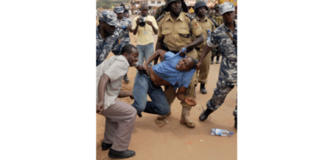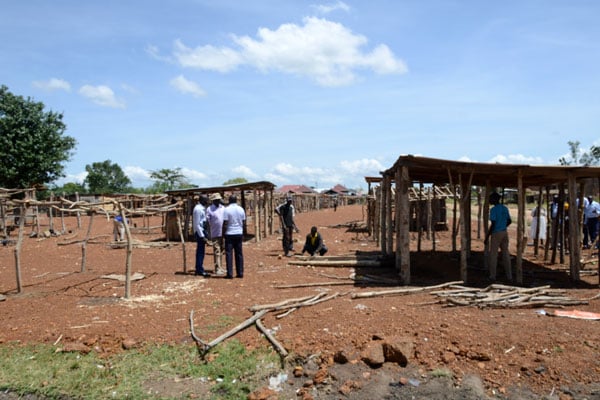Amnesty hits at govt for clawing back civil rights

A man being manhandled by police during the walk to work demonstrations. Photo by Stephen Wandera
UK rights group, Amnesty International (AI), released a 37-page report on Tuesday, and flagged growing impunity by state actors, citing the unpunished “unlawful” killings of unarmed civilians by police and security operatives, during the first phase of walk-to-work demonstrations.
The April/May protests followed a clarion call by Activists for Change (A4C) pressure group to Ugandans to trek, rather than drive or shuttle, to show displeasure with government over its failure to stabilise food and fuel prices at the time.
Masaka Municipality MP Mathias Mpuuga’s group aimed to wring concession from government to lower tax on diesel and petrol – used in manufacture and transportation of most economic goods in the country already suffering from massive hydro-electricity deficits.
The government was rattled when opposition politicians, among them party presidents Kizza Besigye (FDC), Olara Otunnu (UPC) and Norbert Mao (DP), who had just lost a bitterly fought February 18 vote, enlisted in the “civil disobedience” act.
It responded by unleashing regular and military police to quell the protests, and the confrontations resulted in bloody riots, as security forces teargased, apprehended, harassed and clobbered protestors who in turn hurled stones and lit bonfires on roads.
The clashes which began on April 11, the day the country marked the 32rd anniversary of the overthrow of late President Idi Amin, resulted in shooting dead of a dozen or so people, among them a two-year-old baby in Masaka district.
AI in the Tuesday report said “[Uganda] government and various public authorities have in recent years resorted to illegitimate restrictions on the exercise of the rights to freedoms of expression and peaceful assembly in response to some of the critical voices on a number of governance issues.”
The rights group argues that by manhandling opposition political leaders, journalists, human rights defenders and civil society activists, the NRM government had taken to the frontline, gagging influential voices in the broad plan to stifle civil liberties and whittle down the democratic space.
AI’s East Africa Researcher, Dr Godfrey Odongo, said: “The Ugandan authorities are creating a climate where it is becoming increasingly difficult for people to freely criticise government officials, their policies or practices.”
The Uganda government and public officials are increasingly placing illegitimate restrictions on freedom of expression and peaceful assembly to silence critical voices, the rights group noted.
Violent crackdown on marches could have cowed the population and stalled the demonstrations, but not the country’s economic woes that they meant to nudge government to address.
Inflation has surpassed the psychologically important 30 per cent mark, the worst in 18 years. The shilling has made feeble gains from its freefall against the dollar, as the fiscal policy is being tightened to make obtaining loans more expensive as a way of sucking up excess liquidity, and, the government has revised projected economic growth figures downwards by a digit point to 5.5 per cent.
Finance Minister Maria Kiwanuka, who in June read a budget in which government refused to reduce taxes on fuel, the alleged driver of commodity prices, on Tuesday gave a bleak assessment of the economic performance this and the coming year – essentially telling squeezed citizens that things will get worse, not better, in the near future.
Her uncharacteristically blunt address to Parliament is the first of official admission, how deep the economic fissures are, and hollow results of the trial and error attempt at fixing it.
The government says the economic problems are worldwide, as a result of more consumers and less producers, and there is nothing it can do to tame runaway prices of food, fuel and construction materials.
Information Minister Mary Karooro Okurut said yesterday that the situation in the country has been made worse by walk-to-work demonstrations early this year because images beamed by global TV networks of blazing Kampala scared investors as well as tourists, depriving the country of vital foreign exchange.
She questioned why the UK rights group never condemned the “protestors who caused chaos, blocked roads, destroyed property and businesses of innocent civilians and fought with police doing lawful duty of maintaining law and order”.
Uncontrolled crowds, she said, can turn violent such as lately happened in London, to justify why security forces were right to act proactively to prevent widespread destruction.
“It is the duty of government to protect lives and property of citizens and actions taken against the rioters was necessary for order,” said Ms Okurut.
“Relevant organs of government, I am sure, will investigate and punish any security officer who acted in contravention of the law.”
In its report titled, “Stifling Dissent: Restrictions on the Rights to Freedom of Expression and Peaceful Assembly in Uganda”, AI criticises arbitrary arrests and slapping politically-motivated criminal charges on citizens expressing views deemed critical of the authorities.
The group said: “The official response to the protests was to enforce a continuing general ban on all forms of protests, use excessive force in quelling demonstrations some of which had turned violent and to level criminal charges against opposition politicians and their supporters participating in the protests.”
It would be ironic that a UK rights group is asking the UN, the US and European governments to put Uganda on the radar and ask its leaders to uphold human rights when President Museveni in his early days was lavished by the West for introducing democratic reforms, eliminating extra-judicial killings and political persecution.
Yesterday, police denied barring peaceful demonstrations and said all they require of the organisers is that they notify the Force and together plan for appropriate march routes and security of those involved.
“We ask the public to understand that the exercise of civic and political rights is not absolute, that in the enjoyment of the fundamental rights and freedoms, the rights of others should not be violated,” said Mr Vincent Ssekatte, the deputy police spokesperson.
Without giving specifics, he said police personnel named in violation of rights of civilians were punished, and declined to say if disciplinary action had been taken against detective Gilbert Bwana Arinaitwe, captured on camera on May 28 smashing the windows of Dr Besigye’s vehicle before the opposition politician was drenched with liquid pepper, injuring his eyes.
The government has argued that the walk-to-work protests, over which they recently placed Dr Kizza under ‘preventive arrest’, is not as innocent as portrayed because the organisers allegedly have criminal intent and want to cause chaos.
According to Police chief, Maj. Gen. Kale Kayihura, the so-called peaceful demonstrators have caught the fever of the Arab Spring that saw regimes fall in Tunisia, Egypt and Libya and they want to implement that.
Already four opposition activists, including FDC Women League chairperson Ingrid Turinawe, are facing prosecution for treason in relation to walk-to-work demonstrations and have been on remand in Luzira Prison for almost a fortnight.
10 proposals to govt
1. End ban on public rallies.
2. Ensure journalists, human rights defenders, opposition politicians and civil society activists work without fear of intimidation, harassment or retribution by authorities.
3. Withdraw all criminal charges relating to walk-to-work and peaceful assemblies.
4. IInvestigate walk-to-work related unlawful killings and human rights violations and prosecute perpetrators.
5. Penalise public and security officials implicated in manhandling journalists, human rights defenders, opposition politicians and civil society activists.
6. Amend or repeal ‘loosely defined’ laws used to suppress expression of civil liberties.
7. Expunge offences of “sedition” and “publication of false news” from law books since the Constitutional Court already declared them unconstitutional.
8. Withdraw the Public Order Management Bill and the Press and Journalists (Amendment) Bill for lack of adequate legal safeguards against human rights violations.
9.Ratify the African Charter on Democracy, Elections and Governance and the Protocol on the Statute of the African Court of Justice and Human Rights
10.Order police and other law enforcers to end harassment, intimidation, not to abuse civil rights and stop violence against peaceful protests.
The Constitution on demos
Art. 29. “Every person shall have the right to assemble and to demonstrate together with others peacefully and unarmed, and to petition.”
Art. 43. “In the enjoyment of the rights and freedoms, no person shall prejudice the fundamental or other human rights and freedoms of others or the public interest [and] public interest shall not permit any limitation …beyond what is acceptable and demonstrably justifiable in a free and democratic society”
About Amnesty International. It’s a London-headquartered global movement of more than 3 million supporters, members and activists in 150 countries. The group campaigns to end grave abuses of human rights.
Ai envisages that every person should enjoy all rights enshrined in the 1948 Universal Declaration of Human Rights unfettered.
The group, in a brief on its website, says it is independent of any government, political ideology, economic interest or religion. Its activities are financed mainly using contributions by member as well as public donations.




